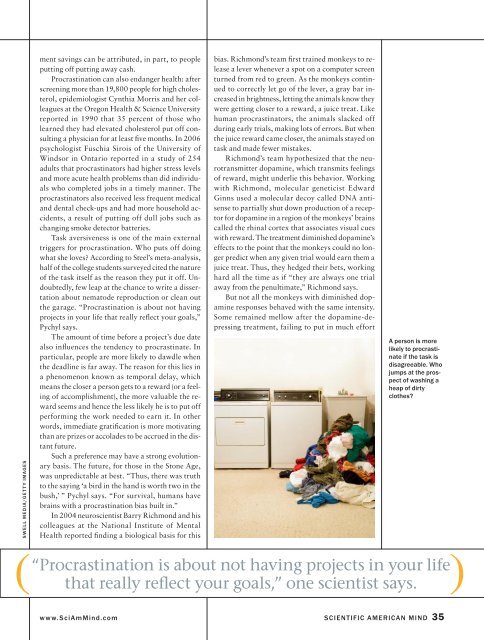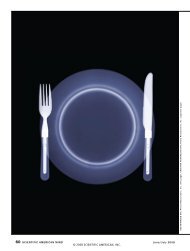Tomorrow - Trisha Gura
Tomorrow - Trisha Gura
Tomorrow - Trisha Gura
Create successful ePaper yourself
Turn your PDF publications into a flip-book with our unique Google optimized e-Paper software.
swell media /ge t t y image s<br />
ment savings can be attributed, in part, to people<br />
putting off putting away cash.<br />
Procrastination can also endanger health: after<br />
screening more than 19,800 people for high cholesterol,<br />
epidemiologist Cynthia Morris and her colleagues<br />
at the Oregon Health & Science University<br />
reported in 1990 that 35 percent of those who<br />
learned they had elevated cholesterol put off consulting<br />
a physician for at least five months. In 2006<br />
psychologist Fuschia Sirois of the University of<br />
Windsor in Ontario reported in a study of 254<br />
adults that procrastinators had higher stress levels<br />
and more acute health problems than did individuals<br />
who completed jobs in a timely manner. The<br />
procrastinators also received less frequent medical<br />
and dental check-ups and had more household accidents,<br />
a result of putting off dull jobs such as<br />
changing smoke detector batteries.<br />
Task aversiveness is one of the main external<br />
triggers for procrastination. Who puts off doing<br />
what she loves? According to Steel’s meta-analysis,<br />
half of the college students surveyed cited the nature<br />
of the task itself as the reason they put it off. Undoubtedly,<br />
few leap at the chance to write a dissertation<br />
about nematode reproduction or clean out<br />
the garage. “Procrastination is about not having<br />
projects in your life that really reflect your goals,”<br />
Pychyl says.<br />
The amount of time before a project’s due date<br />
also influences the tendency to procrastinate. In<br />
particular, people are more likely to dawdle when<br />
the deadline is far away. The reason for this lies in<br />
a phenomenon known as temporal delay, which<br />
means the closer a person gets to a reward (or a feeling<br />
of accomplishment), the more valuable the reward<br />
seems and hence the less likely he is to put off<br />
performing the work needed to earn it. In other<br />
words, immediate gratification is more motivating<br />
than are prizes or accolades to be accrued in the distant<br />
future.<br />
Such a preference may have a strong evolutionary<br />
basis. The future, for those in the Stone Age,<br />
was unpredictable at best. “Thus, there was truth<br />
to the saying ‘a bird in the hand is worth two in the<br />
bush,’ ” Pychyl says. “For survival, humans have<br />
brains with a procrastination bias built in.”<br />
In 2004 neuroscientist Barry Richmond and his<br />
colleagues at the National Institute of Mental<br />
Health reported finding a biological basis for this<br />
bias. Richmond’s team first trained monkeys to release<br />
a lever whenever a spot on a computer screen<br />
turned from red to green. As the monkeys continued<br />
to correctly let go of the lever, a gray bar increased<br />
in brightness, letting the animals know they<br />
were getting closer to a reward, a juice treat. Like<br />
human procrastinators, the animals slacked off<br />
during early trials, making lots of errors. But when<br />
the juice reward came closer, the animals stayed on<br />
task and made fewer mistakes.<br />
Richmond’s team hypothesized that the neurotransmitter<br />
dopamine, which transmits feelings<br />
of reward, might underlie this behavior. Working<br />
with Richmond, molecular geneticist Edward<br />
Ginns used a molecular decoy called DNA antisense<br />
to partially shut down production of a receptor<br />
for dopamine in a region of the monkeys’ brains<br />
called the rhinal cortex that associates visual cues<br />
with reward. The treatment diminished dopamine’s<br />
effects to the point that the monkeys could no longer<br />
predict when any given trial would earn them a<br />
juice treat. Thus, they hedged their bets, working<br />
hard all the time as if “they are always one trial<br />
away from the penultimate,” Richmond says.<br />
But not all the monkeys with diminished dopamine<br />
responses behaved with the same intensity.<br />
Some remained mellow after the dopamine-depressing<br />
treatment, failing to put in much effort<br />
a person is more<br />
likely to procrastinate<br />
if the task is<br />
disagreeable. who<br />
jumps at the prospect<br />
of washing a<br />
heap of dirty<br />
clothes?<br />
( “Procrastination is about not having projects in your life )<br />
that really reflect your goals,” one scientist says.<br />
www.sciammind.com scientific american mind 35



